Many authors who write novels & poetry are unsure which creative writing advice to take. Here are some creative writing tips I wish I’d taken sooner.
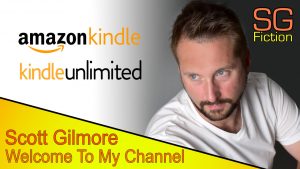
Click on the image to learn a little about Belfast author, Scott Gilmore, on his SG Fiction YouTube Channel Intro video.
Creative Writing Advice From Me To You
Creative writing advice, tips, and nuggets are rolling around my head as I sit in the office in between the bedrooms of my two young children as they settle over to sleep. Ollie is still rumbling around and Lucie is fast asleep. I love this time of night and I always use it to draft my Scott Gilmore Author Blog or my Creative Writing Tips blog for the week. There is something about this time that calms me down and helps me to put my thoughts onto ‘paper’.
The subject of this week’s blog, ‘The Creative Writing Advice I Wish I’d Taken Earlier’, is something of a reflective piece about some of the ideas I had about writing as a younger author, how they impacted my early writing as a playwright, and how I feel I have learned from those lessons as a result. Through my life a as a primary school teacher, I was someone who got used to reviewing everything he did. Every lesson, every test, and every set of planning notes were reviewed and, without that process, I knew I would not have developed as an educator.
It is the same as a writer, author, poet, or playwright. We all need to continually review and consider what we are doing in relation to the pieces we write. Through all stages of writing, we are able to think about how we do it, how we approach it, and how we finalise or redraft it before letting others read our work. This is what I have been thinking about the past while a I redraft my second, upcoming novel, Anna’s Awakening.
My debut novel, Inside Iris, was such a learning curve. I remember writing it on what felt like a surge of adrenaline. Every word, every paragraph, and every chapter poured out of me. I had never felt anything like it and, as a result, I didn’t take as much time to reflect on the process as I should have done once I had completed the novel. I didn’t take time to enjoy the feeling of penning my first novel. In fact, i literally wrote a 65,000-word first draft of Anna’s Awakening straight afterwards.
Should I have taken time to reflect on the achievement? Of course I should have, but we live and we learn.
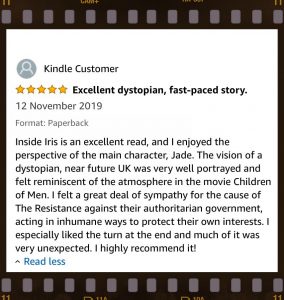
Another awesome 5-star review of Inside Iris. Click the image to view more reviews on the Amazon page.
My successful Young Writers’ Blog, Type Cast, has blown me away. I have learned so much from many awesome and talented young writers from across the world. Over the festive period, I will take a break from the Type Cast blog and hope to resume the pieces before the end of January. I would like to get another 10 authors at least to get me through to around April. If you would like to appear and answer a short questionnaire, please email me in the address below.
If this sounds appealing to you, and you follow me on Twitter, Facebook, LinkedIn or Instagram, please email me at scott@sgfiction.co.uk with your ideas for possible blog titles and subjects. I’d love to hear them.
Throughout my author and creative writing blogs, I want to help share my views and experience of writing, whether you are writing as a beginner or are an experienced novelist. It doesn’t matter, the creative writing advice we share means that we can all learn from one another.

If you are interested in being part of Scott’s Young Writers’ Blog, Type Cast, email him to enquire.
By sharing our craft, our process, and how we work as creatives, we can:
- Help to hone our process further;
- Get inspiration from fellow writers;
- Feel part of a wider community;
- Feel less alone in a very lonely profession, hobby or past time.
This blog is created with my own suggestions that you may disagree with, and that’s fine. The method of exploring others’ views is where we can learn as authors and see what helps or hinders us. We need to remember that the process is for us to write fiction better or write the best stories we can.
Read this author blog article to see what you can learn and please email me at scott@sgfiction.co.uk with your ideas, processes and craft as a writer. I am eager to hear from my contemporaries and fellow authors, writers, poets, playwrights and screenwriters!
Lesson One: You’re In The Driving Seat
As a young writer trying to find a voice in Belfast, Northern Ireland, I was very conscious of the fact that I knew very little about the writing process or what I needed to do to develop as a writer. This led to me enrolling on the Creative Writing Master’s Degree programme in the Seamus Heaney Centre at Queen’s University.
Here, I was able to interact and network with many writers of all ages and experience levels. Writers from their 60’s down to myself at 21 were all expected to turn up on a Friday to share in a seminar followed by a creative writing workshop. This whole experience was new to me and, at the time, I felt overwhelmed by it all.
In my own mind, I felt everyone else knew more than I did and, if it weren’t for a playwright and screenwriter named Daragh Carville, I would likely have dropped out and walked away from writing for good. I owe a lot to this man, who took me on a one-to-one level every Friday morning and gave me feedback on my writing. Every week, I would write scenes for him to ensure he didn’t feel I would let him down or make him doubt his reasons for giving me that time out of his day.
Thank you, Daragh. Loved ‘The Bay‘, by the way!
Through this difficult period, I realised that I was in charge of either walking away or sticking at something. I realised that I could have let ‘constructive criticism‘ get to me or allow it to build me up. I also realised that I was in in the driving seat when it came to the work I wrote, the characters I created, and the world they inhabited.
If you feel insecure about your work as a writer, take it from me, you are in the driving seat and in control of what you create. The worst thing you can do is walk away or never finish a piece because of the worry of what others will say or think. Be brave, be in control, and write the story, poem, script that you want to create.
What Can We Learn?
- Be Determined – your story is yours to write and mould, no one else’s. If you receive a rejection letter or ‘constructive criticism’ at a writers’ workshop, take it for what it is. However, be aware that some people can have wonderful intentions to help you grow, but others can be spiteful about your ideas. It’s a case of weighing them up.
- Be Focused – Look at that point in the distance and have a final destination you want to reach. I know it sounds silly, but you rarely get into the car and ‘just drive’. We do it sometimes and it’s liberating, but most of the time we plan a journey. Do the same with your stories and plays, it can help.
- Shut Up & Drive – You are the one holding the keys, the steering wheel in your hand, and with your foot on the accelerator. You can choose do let that nagging, negative voice in the passenger seat get to you. On the other hand, you can turn up the radio, turn on the ignition, and gag that negative voice as you set off towards that final destination.
What do you think about this, guys? Do you feel in the driving seat when it comes to your own writing, or are you a backseat driver, allowing someone else to direct you? Comment below.

Are you race ready? If you are, what race do you run? Is your writing race a marathon or a sprint? Comment below.
Lesson Two: Writing Is A Marathon, Not A Sprint
As a young writer, I would always want to get to the end. I was someone who knew the story in detail, knew the characters, and the setting. All I wanted to do was write the script and send it off to a local theatre company and see if it was ‘good enough’ to be put on.
Those who read my plays always gave positive feedback, but they also gave me a series of points that I could use to improve the piece. The points would always be around developing a theme or considering how characters relationships played out on stage, etc.
When I got the feedback, part of my mind always said, ‘It’s rubbish! Just start again with the next idea!’
Now, as I look back, I know there are always going to be rubbish ideas that could possibly find their way into the bin. However, most of the ideas we have can be adapted by using real constructive criticism.
When we use proper constructive criticism, and weigh it up appropriately, we can really use it to shape and redefine the work we slaved over. As I look back to that young writer, who ended up shredding dozens of ‘unaccepted’ plays, I just want to get him to stop and think more long-term about the pieces he was feeding into a shredder.
I want him to take the pieces apart and think about what he wants to do with them in 3 or 6 months time. Can he look at the piece from a different character’s point of view? Can he consider making the mother’s relationship more harsh with her daughter for affect later in the play?
There are so many things I want to say to him. All I can do is think about my work now and remember that writing is a long process. It may take multiple drafts and multiple readings of those drafts to land at the finished piece you set out to create. Writing is a marathon, not a sprint. Allowing out writing to breathe by giving time between drafts and possible criticism is golden time to allow our minds to reset. Gaining fresh perspective can be all we need!
What Can We Learn?
- Have A Long-Term Plan – Remember that the first draft is simply to get work onto the page. After that is done, enjoy the feeling of finishing for a few weeks and then get the coloured pens out to redraft it. You need to allow time for the dust to settle and then start again. Allow yourself time to succeed, even if it is a year.
- Review Constructive Criticism – If you are in a writers’ group, piece together the positive and negative comments about your work and think about what you can use. Remember, you are in the driving seat. If someone suggests something you don’t like, you can consider binning it. However, if multiple people pick up on something, look at it carefully because they may have a point.
- It’s Done When It’s Done – If you have a deadline from a publisher, then you can ignore this point. However, many of us out there are either self-published, independently published, or not published at all. If that is the case, you are in charge and can take the time you need. The book is done when it’s done!
Do you agree with this creative writing advice? How do you feel about this lesson, friends? Are you someone who rushes through, or are you the opposite? Can you be so indecisive that you never finish a piece? Comment below.

Having belief in yourself is key. Who else will believe in what you do if you can’t see it for yourself? Comment below with your thoughts.
Lesson Three: The Importance Of Self-Belief
If I’m to be honest, this is something I struggle with at times. As an author reading this, I’m sure you agree that you may have struggled with this at a point in your life too. I doubt very much that there is a writer out there who hasn’t struggled with self-belief.
Last night, I received a message from an ex-pupil of mine who had bought and read Inside Iris. She was a child who I was very fond of and was always smiling. When I lay in bed and opened the message, I read it and smiled. To have someone who knew me as a teacher take the time to message me meant a lot. She didn’t know me as an author. Instead, this girl knew me as her teacher for two years and as someone who told some of the worst jokes ever! She also told me how she loved my book and can’t wait to read the next one!
We all may feel rubbish at times about ourselves as writers or our work when it isn’t well received by others. When we look at it in the cold light of day, no book, movie, poem, or play will be well received by everyone and not every idea will come off. We have to take whatever nuggets of gold we can as we sift through the mire at times.
The message from this ex-pupil made me feel so good about myself and, along with the reviews, I take comfort in the fact that I can write and I can come up with good ideas for stories. As a teacher, I did the same for as many of the pupils I could in my classes. This girl, among other children I taught, weren’t allowed to think or speak negatively about themselves. I would always try to get them to see the bright side, to smile and laugh – hence the rubbish jokes.
As a piece of creative writing advice, self-belief is the most important thing as an artist and a creative. Talent can only get you so far. Self-belief and a hard-work ethic can get you the rest of the way there.
What Can We Learn?
- See The Silver Lining – No matter how grey the cloud is, there has to be a silver lining somewhere. Search for it and find it. Even if it is infinitesimal, wrap it up and take it with you. You never know how much it could mean to you on a bad day.
- You Are An Author – So many people call themselves aspiring authors or say they dream of being an author. Make the decision, write the story, and be that author. Even if you haven’t finish the book yet, believe that you are the author you want to be. If you don’t, no one else will.
- Take Praise When You Get It – I know that ex-pupil didn’t think her message would mean as much to me as it did. I know she sent it just to pass on her thoughts on Inside Iris, but those words had a bigger effect than she’d planned. We all need to take praise where and when we can get it. I loved receiving those kind words, missus! Thank you!
How do you feel about self-belief? How important is it to you as a writer? Have you struggled in the past? What creative writing advice could you share? Comment below.
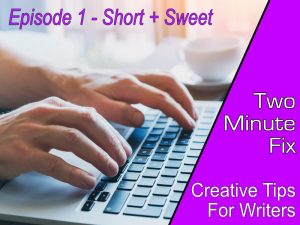
Click the image to watch Scott’s Two-Minute Fix Creative Writing Series on his SG Fiction YouTube channel.
Creative Writing Advice: The Takeaway
There is a huge world of creative writing advice and tips out there, but I feel the best advice comes from true experience. When I write blogs, I always try to relate it to me in some way or another. I don’t see the point in quoting Aristotle’s Poetics or David Mamet‘s thoughts on character development.
Not everyone can relate to the theoretical or the words of an archetypal writer. What I feel we can all relate to is what a fellow writer, author, or creator is experiencing in the here and now. Not many of us can walk in the sandals of a man thousands of years ago, but we can share our feelings and thoughts with a contemporary writer across the pond in Ireland.
The creative writing advice I included above are real issues that I have faced in my short career as a writer, so far. Please share your thoughts or lessons you have learned as a writer below, I love to read them and comment back. Have a productive day and a happy NaNoWriMo!
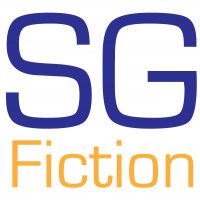
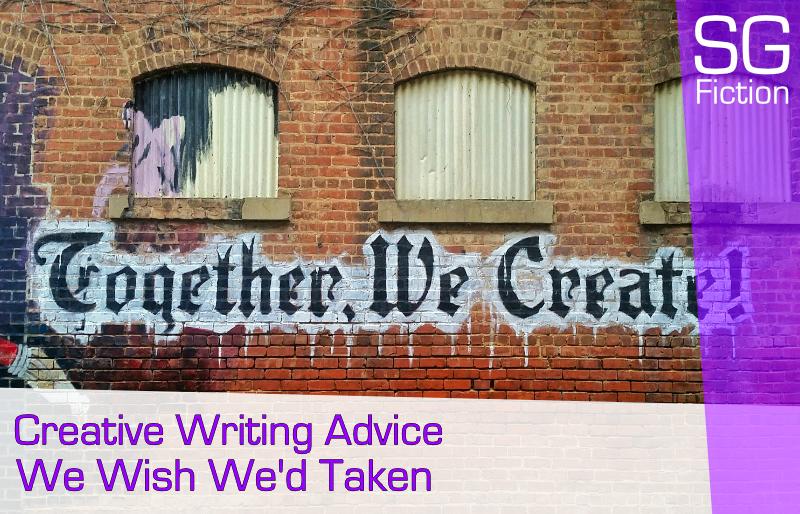
Very helpful blog. Thanks Scott. Your blogs inspire me a lot.
You’re welcome! Keep writing, Sarah!
Good to read someone with similar insights to myself.
Thanks for the comment! We all have similar stories. Keep ploughing on with your WIP!